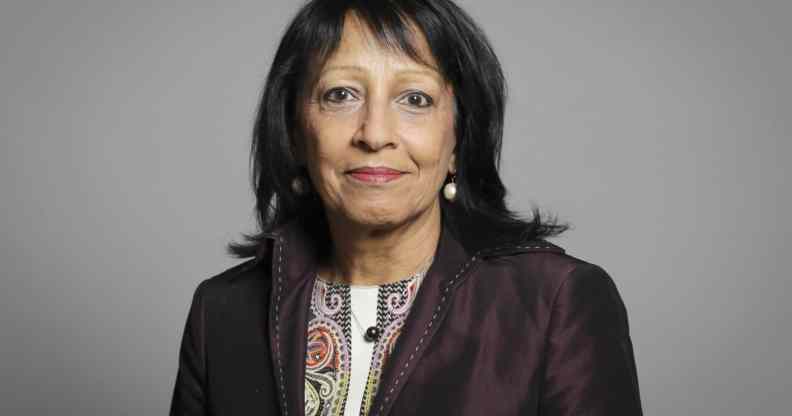Disgraced UK equalities watchdog escapes review over anti-trans stance – for now

Chairwoman of the Equality and Human Rights Commission (EHRC),Baroness Kishwer Falkner. (Parliament)
The Equalities and Human Rights Commission (EHRC), Britain’s equalities watchdog, will not face a special review after a complaint by Stonewall and other LGBT+ organisations.
Stonewall and more than 20 other groups had asked the UN-affiliated Global Alliance of National Human Rights Institutions (GANHRI) to review the EHRC’s “A” status after the commission issued controversial guidance on trans rights.
On Monday (4 April), GANHRI confirmed to PinkNews that it was declining the request, but will be conducting a routine review of the EHRC in October 2022.
Stonewall, The Good Law Project and other groups wanted the EHRC to lose its “A” status, “prompted by the EHRC’s recent, and significant, change in stance on the issue of trans rights”.
In one recommendation, the EHRC said trans people should be excluded from a conversion therapy ban. A second recommendation urged the Scottish government to pause plans to reform gender recognition laws.
They submitted a dossier of evidence showing why they believe the EHRC is no longer “credible” or “fit for purpose”.
In a statement, a GANHRI spokesperson said: “The GANHRI Sub-committee on Accreditation (SCA), after reviewing third-party submissions and the EHRC response to those submissions, did not initiate a special review of EHRC.”
A Stonewall spokesperson said: “GANHRI has written to confirm that the EHRC’s regular review is scheduled in October, so the 27 organisations involved in the submission are now focusing on this opportunity to collect and present evidence.
“The request for a review into the EHRC’s status is prompted by the body’s recent, and significant, change in stance on the issue of trans rights, which now stands in stark contrast to international human rights standards.”
The EHRC first announced that the complaint brought forward by LGBT+ groups had been rejected in a statement on Friday (1 April) – before either Stonewall or Good Law Project were made aware.
“The EHRC has a crucial role to play as a strong and independent regulator and many campaigning organisations share our goal: a Britain where no one is discriminated against for who they are,” Marcial Boo, EHRC chief executive, said in a statement.
“We are pleased that the Sub-Committee on Accreditation assessed evidence of our independence and effectiveness and upheld our position, declining a special review of our work.
“As we launch our new strategy, we are reaching out to organisations that have been critical of the EHRC, encouraging them to put aside past disagreements and to work with us and other like-minded organisations to protect everyone and to achieve a fairer society for all.”
Jo Maugham, director of Good Law Project, argued that the EHRC had jumped the gun because it will shortly be considered for a periodic review, even if it won’t face a special review.
Maugham said he’s also aware of another leading group that’s preparing a submission to GANHRI “about the EHRC’s increasing tendency to advance the government’s political agenda rather than protecting disadvantaged communities from it”.
The equality watchdog reportedly met with anti-trans groups
The EHRC has faced relentless criticism from LGBT+ organisations in the last number of months over its approach to trans rights.
Leaked documents obtained by Vice World News in February showed that the EHRC held multiple “private meetings” with anti-trans groups and leaders, including the LGB Alliance and Fair Play for Women.
Questions have been raised about the independence of the EHRC because the body’s chair is appointed by equalities minister Liz Truss. She appointed Baroness Kishwer Falkner as chair in 2020.
David Isaac, Falkner’s predecessor, told The Guardian in January: “She says, ‘I’ve appointed a new chair and these new commissioners’, and she doesn’t say ‘they’re going to do my bidding’, but it’s pretty implicit in what she’s saying that they are people who are supportive of her approach to equalities, which is a focus on white working-class people and the north of England and the levelling up agenda.”
He continued: “My view is that an independent regulator shouldn’t be in a position where the governments of the day can actually influence the appointments of that body to support a particular ideology.”
Questions surrounding the EHRC’s independence exploded in January when it issued two recommendations that would slow progress on trans rights.
The watchdog’s latest controversy arrived Monday (4 April), when it released guidance on single-sex spaces that explained how service providers could lawfully exclude trans people.
When announcing its complaint, Stonewall said: “The EHRC’s stance seeks to strip trans people of legal protections, and pose a grave threat to the ability of trans people to participate in daily life with dignity and respect.”

